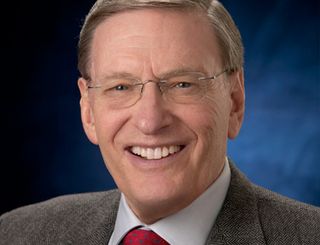Allan H. ‘Bud’ Selig

Related: Inductees Forge Individual Paths To Success
As the NBA's Adam Silver and the NFL’s Roger Goodell have found out over the past year, being a professional sports commissioner is not for the faint of heart.
“If you’re a commissioner, you’re going to have fires to put out,” says former pitcher Ron Darling.
But along with the fires, Allen H. “Bud” Selig’s tenure has brought exponential growth of the sport’s television presence and profits during his 22 years as Major League Baseball commissioner. “He left the game better than when he joined it,” says Darling, who now works as a national analyst for Turner and locally for New York Mets games on SNY. “I think that’s the best thing you can say about any CEO, which is what he was.”
Under Selig, who will retire Jan. 24, MLB has experienced arguably the most impressive surge of growth in its storied history. It has added four new franchises and signed numerous rights deals, most recently an eight-year pact in 2012 with its media partners Fox, ESPN and Turner that will put more than $12 billion in the league’s coffers.
“I don’t think any commissioner of any league at any time has done more in a 22-year period to make games accessible for fans,” says Bob Bowman, president & CEO of MLB Advanced Media (Bowman also oversees the MLB Network). Bowman also credits Selig for the league’s digital growth. “Without Bud Selig there is no MLBAM.”
Bowman lauds Selig’s fortitude during those tough times in the Internet’s early days, when many companies were failing. “[2001] and 2002 were not glorious days in the Internet,” Bowman says. MLBAM, which operates the league’s website, as well as its out-of-market OTT package for games, doubled its revenue from $300 million in 2006 to more than $600 million in 2012.
Broadcasting & Cable Newsletter
The smarter way to stay on top of broadcasting and cable industry. Sign up below
Selig’s relationship with the game stretches all the way back to his childhood in Milwaukee.
“I had intense interest in the sport from the time I was a kid,” he says. “Everyone [in college] remembers me listening to all those Milwaukee Braves games on the radio.” Selig first got his foot in the MLB door as a minority owner for former Milwaukee Braves franchise.
When the Braves wanted to move to a larger market in Atlanta, Selig initially tried to block the move by founding Teams Inc. When his attempt to keep the team in Milwaukee finally failed after the 1965 season, he changed the group’s name to Milwaukee Brewers Baseball Club Inc., after the minor league team. Selig then made it his goal to bring Major League Baseball back to the city, which he was finally able to do in 1970, when he purchased the bankrupt Seattle Pilots.
“The years of trying to get a team to Milwaukee taught me a lot about patience,” Selig says.
In 1992, then-commissioner Fay Vincent resigned amid unrest from the owners about his performance. Selig, who was at that time chairman of MLB’s Executive Council, became the acting commissioner. His first few years proved grueling, as baseball was going through a period of labor clashes with the players, culminating with the 1994 strike that led to Selig’s difficult decision to cancel the World Series. Following a six-year search for a new commissioner, Selig was voted as the league’s ninth commissioner in 1998.
Under Selig, baseball was able to recover from the mid-90s downturn, though some of what contributed to bringing back the fans ended up blowing up into its own scandal: the rampant steroid abuse by many of its marquee players. After enduring criticism over a lack of restrictions on performance-enhancing drugs, Selig spearheaded the development of a drug policy which now ranks as the toughest in the major U.S. pro sports. He calls it one of his crowning achievements.
Selig did irk more than a few purists with modifications of the traditionrich sport. He initiated interleague play, unified operations in the American and National Leagues, implemented wild card playoff formats to double the number of teams in the postseason, and awarded home-field advantage in the World Series to the league whose team wins the annual All-Star Game in July.
Selig would argue you could credit the growth of baseball to many of those. “It’s a hard lesson to learn, but I learned that in difficult situations, whatever one decides someone is going to be mad,” he says. “You have to learn to live with that and do what you think is in the best interest of the game.”
The spotlight on those issues has overshadowed the labor peace the MLB has enjoyed since that 1994 strike, and many attribute that to Selig. “Because of all the [steroid scandals], the labor issues seem to have stayed behind the scenes,” says Hall of Fame player Cal Ripken, who now works as an analyst for TBS. “[Constant labor strife] was one of the bad marks for baseball.”
While every other major sport—the NBA, NFL and NHL—have all had lockouts, two of which saw games canceled in the past three years, MLB has enjoyed 21 years of labor peace.
“He’s handing off a game that is in great shape, certainly compared to the game that he inherited when he started,” says Rob Manfred, the league’s COO and Selig’s designated replacement in 2015. “[Labor peace] was probably more important to the growth of the game than anything else he achieved.”
Perhaps that is why Selig doesn’t appear concerned with how others view his tenure. “I’m going to let historians determine what my legacy should be.”
Selig may be retiring from MLB, but don’t expect him to hit the golf course. “I do want to write a book and I do want to teach,” he says. “I wanted to be a history professor and it took me to age 80 to become one.”
